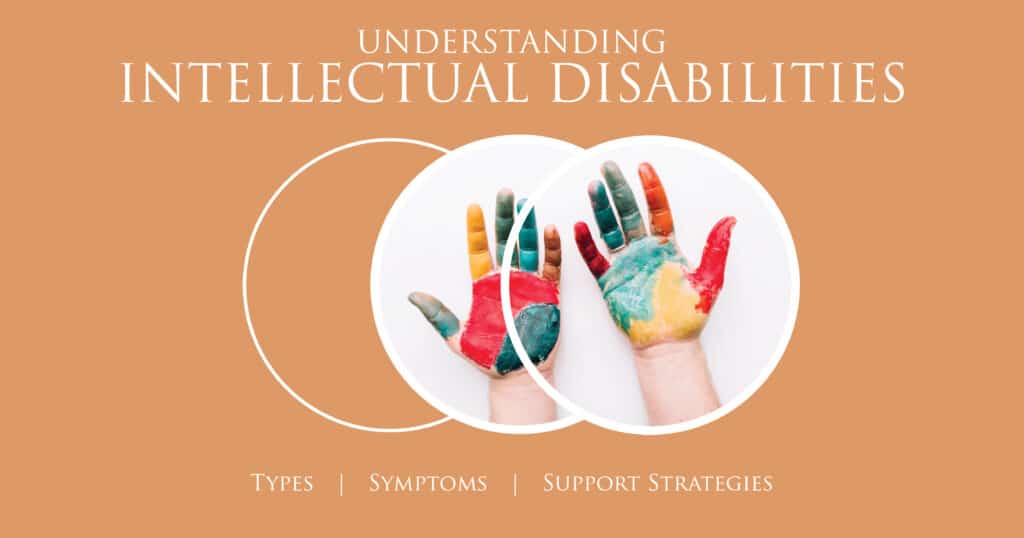Welcome to our deep dive into the world of intellectual disabilities. This post aims to shed light on what intellectual disabilities are, the different types, their symptoms, and the best strategies for providing support. Whether you’re a caregiver, an educator, or simply someone keen to understand more about these conditions, this guide is here to provide you with practical, compassionate insights.
Essential Takeaways
Early Identification and Intervention are Crucial: Identifying intellectual disabilities early allows for timely intervention, which can significantly improve developmental outcomes. Early support through therapies, educational programs, and medical care helps individuals reach their full potential and adapt better to life’s challenges. Intervention services tailored for children with disabilities can facilitate smoother transitions into everyday life.
Tailored Support Strategies Enhance Quality of Life: Personalized support strategies, including specialized educational plans, targeted therapies, and community involvement, play a critical role in managing developmental disabilities. Tailoring support to individual needs helps address specific challenges and fosters personal growth and independence. This is especially vital for children with autism spectrum disorders, who often require structured environments to thrive.

Community and Family Support are Key: Building a supportive network through family, friends, and community resources is essential. Engagement in community programs and support groups can provide emotional support, promote inclusion, and offer practical assistance. Advocating for better services and spreading awareness contributes to a more inclusive and understanding society, ensuring the rights of people with intellectual disabilities are upheld.
San Jose Mental Health
What Are Intellectual Disabilities?
Intellectual disabilities are conditions characterized by limitations in cognitive functioning and adaptive behaviors. These disabilities impact learning, problem-solving, and the ability to perform everyday tasks independently. Developmental delays are typically identified before the age of 18 and are lifelong conditions.
Imagine trying to navigate the world with a mind that processes information at a slower rate than those around you. Individuals with disabilities can find it challenging to understand complex instructions or engage in social interaction effectively. But just as important is recognizing that these disabilities don’t define a person’s potential or their value. With the right support, individuals with intellectual disabilities can lead fulfilling, productive lives.
Why Understanding Intellectual Disabilities Matters
Understanding intellectual disabilities is crucial for several reasons. First, it helps to reduce the stigma associated with these conditions. When we educate ourselves about the challenges faced by individuals with intellectual disabilities, we foster empathy and promote a more inclusive society.
Moreover, knowledge about these disabilities enables us to provide better support. By understanding the specific needs of individuals, we can offer more effective interventions and create environments that cater to their strengths and challenges. This not only improves the quality of life for persons with disabilities but also benefits families, educators, and communities as a whole.
Types of Intellectual Disabilities
Common Types of Intellectual Disabilities Intellectual disabilities encompass a range of conditions, each with its own characteristics. Let’s explore some of the most common types:
Down Syndrome Down Syndrome is a genetic condition caused by the presence of an extra 21st chromosome. This additional genetic material affects development, leading to physical traits such as a flat facial profile and a slanted eye appearance. Individuals with Down syndrome may also experience developmental delays and cognitive impairments.
Support Needs and Interventions:
- Early Intervention: Programs focusing on speech, occupational, and physical therapy can help with developmental milestones.
- Educational Support: Specialized educational programs tailored to the individual’s needs, especially critical for toddlers with disabilities.
- Healthcare Monitoring: Regular check-ups to manage health issues associated with Down syndrome.
Fragile X Syndrome Fragile X Syndrome is caused by a mutation in the FMR1 gene on the X chromosome. This condition often leads to developmental delays, learning disabilities, and behavioral challenges such as hyperactivity and social anxiety.
Support Needs and Interventions:
- Educational Strategies: Individualized learning plans and behavioral interventions, particularly beneficial for students struggling with classroom behavior.
- Therapies: Speech and language therapy, as well as occupational therapy, can enhance communication skills.
- Behavioral Management: Techniques to address social and emotional challenges.
Williams Syndrome Williams Syndrome results from a deletion of genetic material on chromosome 7. Individuals with Williams syndrome may have distinct physical features and experience learning disabilities, particularly in mathematical and spatial tasks.
Support Needs and Interventions:
- Specialized Education: Focused on enhancing academic and social skills.
- Medical Care: Regular evaluations to manage cardiovascular issues often associated with the condition.
- Social Skills Training: To aid in developing interpersonal relationships and effective adaptive skills.
Autism Spectrum Disorder (ASD) Autism Spectrum Disorder (ASD) is a broad term that encompasses a range of symptoms affecting communication, social interaction, and behavior. The spectrum nature of ASD means that symptoms can vary widely in severity.
Support Needs and Interventions:
- Early Diagnosis and Intervention: Behavioral therapies and speech therapy to improve communication development and social skills.
- Educational Support: Programs that focus on structured learning and social skills development.
- Family Support: Guidance on managing daily challenges and fostering an inclusive environment.
Other Less Common Conditions Conditions such as Rett Syndrome and Phelan-McDermid Syndrome also fall under the category of intellectual disabilities. Each of these conditions has unique symptoms and requires tailored support strategies.
- Rett Syndrome involves progressive neurological symptoms and is typically diagnosed in young girls.
- Phelan-McDermid Syndrome is characterized by developmental delays and physical abnormalities due to a deletion on chromosome 22.

San Jose Mental Health
Symptoms and Challenges
Recognizing Symptoms of Intellectual Disabilities Recognizing the symptoms of intellectual disabilities involves understanding a range of cognitive, adaptive, and behavioral challenges.
Cognitive Symptoms Individuals with intellectual disabilities often face difficulties with learning and memory. This can manifest as:
- Slower Processing Speed: Taking more time to understand and respond to information.
- Difficulty with Problem-Solving: Struggling with tasks that require reasoning or abstract thinking.
- Memory Issues: Challenges in retaining and recalling information.
Adaptive Behavior Symptoms Adaptive behaviors are everyday skills necessary for self-care and independence. Individuals with intellectual disabilities may struggle with:
- Self-Care Skills: Difficulty with activities such as dressing, grooming, and managing personal hygiene.
- Communication: Challenges in expressing needs, understanding language, and engaging in social interactions.
- Social Skills: Difficulty with forming and maintaining relationships, interpreting social cues, and responding appropriately in social situations.
Emotional and Behavioral Symptoms Emotional and behavioral challenges can also be prevalent:
- Emotional Regulation: Issues with managing emotions, leading to frequent outbursts or emotional distress.
- Behavioral Problems: Behaviors such as impulsivity, aggression, or repetitive actions may be observed.
- Social Interactions: Difficulties in understanding social norms and building connections with peers.
Support Strategies for Intellectual Disabilities
Effective Support Strategies Supporting individuals with intellectual disabilities requires a multifaceted approach that addresses educational, therapeutic, and social needs.
Educational Support Educational support is essential in helping individuals with intellectual disabilities thrive academically and socially:
- Specialized Educational Programs: Tailored to meet individual learning needs and abilities, especially for those diagnosed with behavioral disorders or Attention Deficit Hyperactivity Disorder.
- Individualized Education Plans (IEPs): Customized plans outlining specific goals, accommodations, and support services.
- Inclusive Education Practices: Strategies that integrate students with intellectual disabilities into mainstream classrooms with appropriate supports, ensuring access to special education services.
Therapeutic and Medical Support Therapies and medical care play a crucial role in addressing specific challenges:
- Occupational Therapy: Focuses on improving daily living skills and fine motor abilities.
- Speech Therapy: Aims to enhance communication skills and address language difficulties.
- Behavioral Therapy: Techniques to manage behavior and develop social skills.
- Medical Management: Monitoring and addressing any health issues associated with the intellectual disability.
Social and Community Support Creating a supportive community environment helps individuals feel included and valued:
- Community Programs: Activities and programs that promote social interaction and participation.
- Social Skills Training: Programs designed to improve interpersonal skills and social engagement.
- Advocacy and Awareness: Efforts to promote understanding and acceptance within the community, including the American Association on Intellectual and Developmental Disabilities and local advocacy groups.

Practical Tips for Daily Life
Implementing practical strategies at home can make a significant difference:
- Structured Environment: Establishing routines and clear expectations to provide stability.
- Promoting Independence: Encouraging self-care skills and providing opportunities for personal growth.
- Positive Reinforcement: Celebrating achievements and providing encouragement to boost confidence.
Conclusion
Moving Forward with Understanding and Support Understanding intellectual disabilities is the first step toward creating a supportive and inclusive environment for individuals affected by these conditions. By learning about the various types, recognizing symptoms, and implementing effective support strategies, we can make a meaningful difference in the lives of those with intellectual disabilities.
Ready to make an impact? Start by learning more about local resources and support organizations dedicated to intellectual disabilities. Get involved in community events, advocate for better services, or simply share your newfound knowledge to raise awareness. Every effort counts in building a more inclusive world. Share your experiences, ask questions, or offer support in the comments below—let’s work together to make a positive change!
San Jose Mental Health
Frequently Asked Questions (FAQs)
- What are the most common intellectual disabilities? The most common intellectual disabilities include Down Syndrome, Fragile X Syndrome, Williams Syndrome, and Autism Spectrum Disorder (ASD). Each of these conditions has its own set of symptoms and support needs, but they all involve challenges with cognitive functioning and adaptive behaviors.
- How can I identify if someone has an intellectual disability? Identifying an intellectual disability typically involves observing developmental delays or difficulties with learning, communication, and daily living skills. Symptoms might include trouble understanding complex instructions, difficulty with problem-solving, or challenges in social interactions. Professional evaluation by a psychologist or developmental pediatrician is necessary for a formal diagnosis.
- What types of therapies are available for individuals with intellectual disabilities? Several therapies can benefit individuals with intellectual disabilities, including:
- Occupational Therapy: Helps with daily living skills and fine motor skills.
- Speech Therapy: Focuses on improving communication abilities.
- Behavioral Therapy: Addresses behavioral issues and promotes positive behavior through structured interventions.
- Educational Therapy: Tailors learning strategies to fit the individual’s needs.
- How can I support a loved one with an intellectual disability at home? Support at home can involve creating a structured environment with clear routines, promoting independence by encouraging self-care activities, and using positive reinforcement to celebrate achievements. Additionally, being patient and understanding, and providing emotional support can make a significant difference.
- Are there community resources available for individuals with intellectual disabilities? Yes, numerous community resources are available, including local support groups, special education programs, advocacy organizations, and social services. These resources can offer educational support, therapy, social activities, and opportunities for community involvement.












